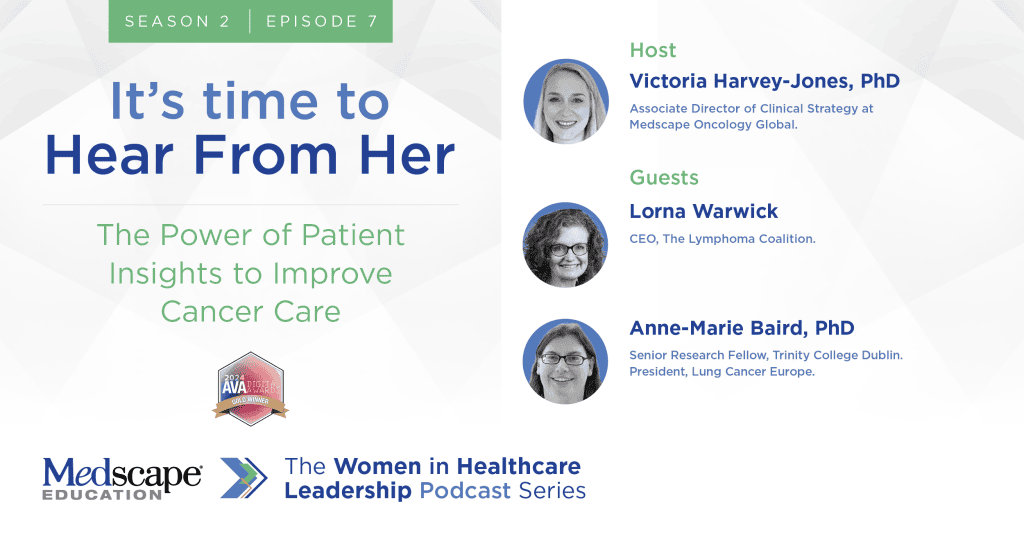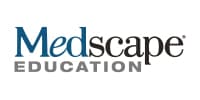The Power of Patient Insights to Improve Cancer Care
May 30, 2024 | Women in healthcare, medical education, oncology, podcast
Two global patient advocacy groups—The Lymphoma Coalition and Lung Cancer Europe— are compiling data from their communities on the real-world experience of living with cancer. What the data reveals sometimes challenges existing protocols around cancer care.

The role of The Lymphoma Coalition is to “generate and provide trusted information, knowledge, and best practices to influence and improve care” for those affected by the disease, says Lorna Warwick, the coalition’s CEO.
Our mission is to be the voice of Europeans impacted by lung cancer, says Anne-Marie Baird, president of Lung Cancer Europe.
Though they are advocating for patients with different types of cancer, these two inspiring healthcare leaders have a shared passion: to ensure that the patient voice, and patient insights, are integrated into the current knowledge base in order to improve cancer care.
Collecting insights from patient communities—through global surveys, working groups, annual gatherings, focus groups, or community advisory boards—provides valuable learnings from those living with these diseases as well as their family members and caregivers. And sometimes those learnings yield data that differs from that of academic researchers.
Warwick recalls sitting at a congress “and being invited to bring the patient perspective using our data and having this really intense discussion—disagreeing with a leading clinical expert in the area of discussion—and feeling confident because I had the data to counter him and say, ‘No, that’s not actually what the patients are telling us. There’s a gap here that needs to be addressed.’ ” And then having other doctors come up to her later and saying they want to change clinical practice based on her presentation.
Some issues that patients grapple with—nausea, fatigue, fear and anxiety, depression, body image—may be ones that doctors have minimized in previous patient conversations since they’re focused more on medical outcomes. So patients try to handle those things on their own. Warwick says that for optimal care it’s important to have those discussions about how patients are feeling. “I say this to doctors all the time: If you add one thing to the conversation with your patients it’s just to ask them, ‘What’s the one thing that’s really bothering you right now?’” What would improve your quality of life?
Warwick knows this can open up a can of worms because patients may bring up things that are totally outside of a doctor’s comfort zone. But, that doesn’t mean that we still don’t need to have the conversation and help them, she says. What Warwick wants clinicians to know is that advocacy organizations have great resources to give the patients the support that they need, and to have a better experience overall despite the medical outcomes of their disease.
As well as educating policy makers, academic researchers, and clinicians, Baird says her pan-European Organization also tries “to develop tools to equip members to do things at a national level. We want people who are able to help to build capacity, to educate, to help create awareness.” We need expert patients to have a seat at the table with pharma, for clinical trials, protocol developments, whatever it might be, Baird says. Not just at the end to develop patient advocacy leaflets. So they need to be comfortable knowing the terminology and with the conversation so they can bring their “real world, lived experience” into the mix.
This is the 2nd in a two-part conversation with Lorna Warwick, CEO, The Lymphoma Coalition and Anne-Marie Baird, President Lung Cancer Europe. To listen to Part I, click here. Hosted by Victoria Harvey-Jones, Associate Director of Clinical Strategy at Medscape Oncology Global.
To read Medscape Oncology’s white paper on patient centricity and improving cancer outcomes, click here.
Follow us for updates on upcoming podcasts and more insightful conversations.
For more information, please contact Jelena Spyropoulos (Global) or Piyali Shin (US).
About Medscape Education Medscape Education (medscape.org) is the leading destination for continuous professional development, consisting of more than 30 specialty-focused destinations offering thousands of free accredited CME and CE courses for physicians, nurses, and other healthcare professionals.
This content was provided by Medscape Education
Company Details
Latest Content from Medscape Education
A “Leaky Pipeline” and the Loss of Talented Female Physicians
A leaky pipeline that begins during medical school and extends throughout the training process means we lose many talented women, says Fatima Rodriguez, director of preventive cardiology and associate professor...
Medscape Oncology’s Large Presence at ASH 2023
Medscape Education is returning to the annual ASH conference with eight symposia, two publications, and the opportunity for clinicians to challenge their knowledge with MedChallenge.The eight symposia will be held...
Medscape Education Redefines Standards with Website Redesign
Medscape Education—the number 1 destination for CME—--has launched a redesign of its education hub. The site now features easy-to-navigate categories, a highlight on curricula, and enhanced search capabilities, allowing Medscape...
The Power of the Partnership: How Patient-Centricity Improves Care
How can the patient’s voice improve care?This was the question Medscape Oncology Clinical Strategist Victoria Harvey-Jones, PhD and Lesley Fallowfield DBE, BSC, DPHIL, FMEDSCI, Professor of Pyscho-Oncology, Sussex Health Outcomes...
World AIDS Day 35: Medscape’s Commitment to the Elimination of HIV through Education and Looking Towards the Future
December 1 marks the 35th year commemorating World AIDS Day, and the theme is “Remember and Commit.” While new infections have steadily declined over the last several years, HIV remains a...
Planting the Seeds for Future Women Leaders in Medicine
What are the qualities needed to be a leader in the medical field of oncology?Of course, you must be a good clinician. But you also have to be wise and...
Unmet Needs and Novel Advances at the 2023 Women’s Health Master Class
On November 8-9, Medscape Education held the 2nd Annual Women’s Health Master Class—Modernizing Women's Health: Elevating Quality Care for Everyday Practice, two days dedicated to bringing the latest advances in...
A Passionate Cause: Elevating Women to Reshape Medicine
“We need more outstanding leaders from underrepresented communities, including women and those from different ethnicities”, says Antonella Chadha Santuccione, co-founder and CEO of the nonprofit Women's Brain Project in Zurich,...





